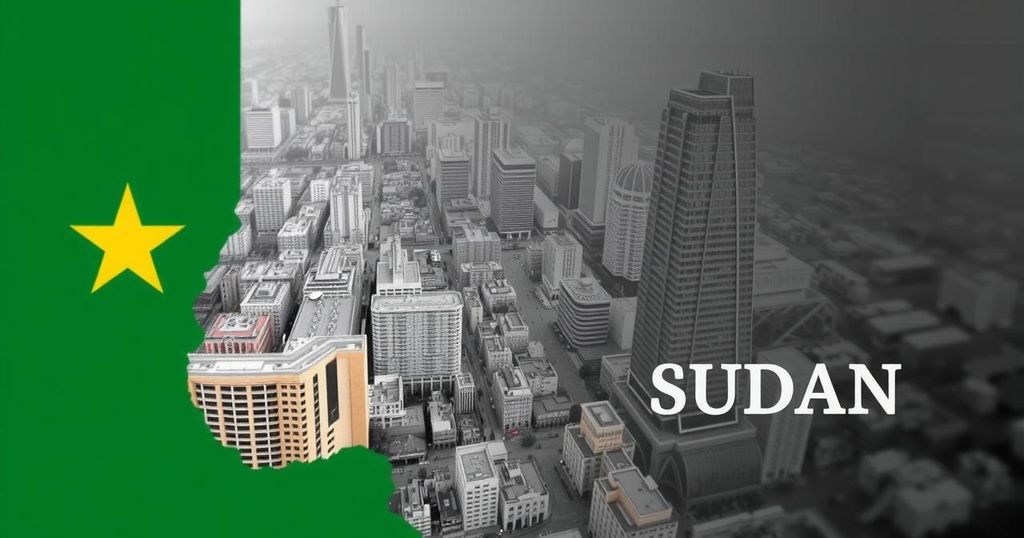Global news
AFRICA, AFRICAN DEVELOPMENT BANK, CIVIL WAR, CONFLICT RESOLUTION, GI, GIBRIL IBRAHIM, HUMANITARIAN CRISIS, IBRAHIM, IMF, INTERNATIONAL CONFERENCE, INTERNATIONAL MONETARY FUND, JEM, JUSTICE AND EQUALITY MOVEMENT, NEW YORK, NORTH AMERICA, PEACEKEEPING, PORT SUDAN, RAPID SUPPORT FORCES, RS, RSF, SUDAN, SUDAN TRIBUNE, SUDANESE ARMY, SUDANESE DIASPORA, UAE, UNITED STATES, UNITED STATES OF AMERICA, WASHINGTON, WORLD BANK
Marcus Li
0 Comments
Sudan Appeals to U.S. for Action Against UAE Support for RSF
Sudan’s Finance Minister Gibril Ibrahim has called on the U.S. to persuade the UAE to end its support for the Rapid Support Forces, citing the exacerbation of the conflict in Sudan. He emphasized that Emirati backing fuels violence and expressed hope that its cessation could lead to peace. During his trip to Washington, Ibrahim secured substantial funding for Sudan’s development from international financial institutions.
On November 15, 2024, in a significant diplomatic appeal, Sudan’s Finance Minister, Gibril Ibrahim, called upon the United States to exert pressure on the United Arab Emirates (UAE) to cease its support for the Rapid Support Forces (RSF). This paramilitary group has been engaged in fierce clashes with Sudan’s army since April, leading to widespread conflict and humanitarian crises within the country. In an interview, Ibrahim emphasized that the ongoing Emirati support is exacerbating the violence and urged that its cessation could potentially resolve the ongoing war in Sudan. Ibrahim expressed hope that the United States would intervene on behalf of the Sudanese people, stating, “The Sudanese people hope that the United States of America will restrain its ally, the UAE, from supporting the militia and stop it from killing innocent Sudanese.” He articulated that the end of Emirati assistance would correlate with an end to the fighting in Sudan. Allegations of the UAE supplying arms and resources to the RSF through other African nations have intensified concerns over foreign influence in Sudanese affairs, During his visit to Washington, where he held discussions with the World Bank and the International Monetary Fund, Ibrahim addressed rumors of dissension between the Sudanese army and the allied militias. He dismissed these allegations as “baseless,” affirming strong unity in their struggle against the rebellion, stating, “the movements and the army are one body in the battle for dignity.” He acknowledged potential future demands for greater power distribution but stressed the current focus on national unity and the immediate need to vanquish the conflict. Ibrahim also outlined the extensive destruction wrought by the ongoing war and requested assistance from international financial institutions to conduct a thorough assessment of the damage. He secured significant financial commitments during his travels, including $253 million from the World Bank and $100 million from the African Development Bank aimed at aiding Sudan’s development projects. Additionally, he engaged with members of the Sudanese diaspora to address various concerns and foster international support for rebuilding efforts.
Sudan has faced ongoing turmoil since the outbreak of conflict between the Rapid Support Forces and the national army. This clash has resulted in severe humanitarian consequences, including mass displacement and casualties. The involvement of foreign nations such as the UAE has sparked considerable debate about external influences contributing to internal strife. The pleas made by Sudanese officials represent a push for greater international engagement and support to stabilize the situation and foster reconstruction efforts amidst ongoing violence.
In conclusion, Sudanese Finance Minister Gibril Ibrahim’s appeal for U.S. intervention against UAE support for the RSF underscores the complex dynamics of foreign involvement in Sudan’s civil strife. The recognition of the conflict’s devastating effects has catalyzed efforts for international aid and assessment. By securing significant financial support, Ibrahim’s visit signals a potential path towards stabilization and rebuilding, provided key foreign actors respond to the urgent pleas from Sudan’s leadership.
Original Source: sudantribune.com




Post Comment